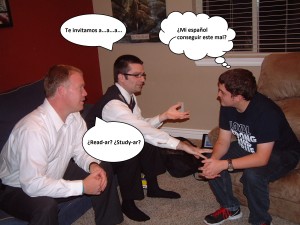A Japanese man walked around a campus parking lot looking lost. He needed help but was having trouble finding it because he did not speak English.
Sgt. Jeff Vest of the University Police saw the man and helped him find his car, using the Japanese he learned on his mission. Vest said he was pleasantly surprised he remembered enough Japanese to help the man. He served his mission from 1973 to 1975 and has not had many chances to use the language since he returned.
While research shows languages will be forgotten over time, people who have learned a language well will never entirely forget it, said Dr. Dan Dewey, a BYU associate professor of linguistics.

“Returned missionaries remember enough to at least do something in the language even when they’re in their 60s or 70s,” Dewey said in an email. “Typically people feel less confident and capable after about four or five years from a mission.”
People with high proficiency in a language tend to remember it better. Teaching styles that encourage interaction and development in using a language lead to higher proficiency levels, according to Dr. Robert Russell, emeritus associate professor of Japanese at BYU. He said being in a natural language setting is a very good way to learn a language well.
According to Dewey, returned sister missionaries usually forget more of a language and faster than elders do.
“This is probably because they have less time in the country and, therefore, less experience with the language,” Dewey said.
For the first few years after returning from a mission, there is no significant language loss, Russell said. Eventually people will start to forget parts of the language, but the loss is more rapid if there are no opportunities to use the language. Vocabulary is typically the first thing to be forgotten, followed by grammar rules.
Maintaining multiple languages has advantages beyond speaking and reading skills. Research done by Ellen Bialystok of York University showed bilingual and multilingual people start to show cognitive decline later than those who only know one language. Dewey said people who are genetically predisposed to diseases like Alzheimer’s can delay the onset by learning and maintaining a second language.
Research has shown several ways to maintain a second language. One of the best ways to maintain a language is through reading, Russell said.
“Reading and other literacy skills seem to be positively correlated with acquisition of language and retention of language, including the skills of listening and speaking,” Russell said. “I would try and discipline myself to read 15–30 minutes a day in my target language.”
People will also remember languages longer if they have formal instruction in the language. Russell said he would suggest returned missionaries get at least a minor in their target languages.
Returned missionaries can also keep up their language by finding a native speaker to study with. The English Learning Center on campus has a study buddy program that pairs students learning English with someone learning their native language. The study buddies help each other learn the other person’s language.
The Internet is making it easier to maintain a language. Returned missionaries can keep practice just by conversing with native speakers on Facebook or Skype. LinkedIn has some special interest groups for learning other languages. International TV channels, news and movies are also available on the Internet.
Russell also suggests getting a language dictionary app for smartphones. Many of these apps are free and have list and review functions.
With all the resources now available to help maintain a language, returned missionaries can have an easier time using their second language later in life.




